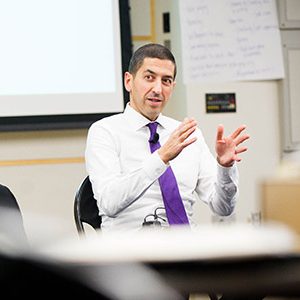Egyptian President Abdel-Fattah El-Sisi has established an advisory council that will include Boston University’s Farouk El-Baz and 15 other renowned academics and experts.
El-Baz is a College of Arts & Sciences research professor of archaeology and a College of Engineering research professor of electrical and computer engineering and director of Boston University’s Center for Remote Sensing. He is also part of the associated faculty at the CAS Department of Earth & Environment.
Members of the council, which El-Sisi formally announced in a presidential decree on September 6, will have a vital role in national projects, including the creation of a channel that runs parallel to the Suez Canal and the Egyptian government’s efforts to improve roads. Council members also will help El-Sisi in his fight to improve education in Egypt, as well as help diminish religious turmoil within the country’s borders and improve discourse within the media.
“I am very proud to have been selected to join President El-Sisi’s advisory council,” says El-Baz. “To have been chosen alongside so many distinguished individuals is a true honor, and I look forward to working with the other members and the president on a wide range of issues that the Egyptian government and its people face today.”
This is not El-Baz’s first time working alongside the Egyptian government. From 1978 to 1981, he was science adviser to the late President Anwar Sadat. Due to increases in population and other factors, Sadat believed Egyptians should spread out from the Nile Valley and utilize more of the surrounding desert’s land. El-Baz was given the task of choosing and developing several desert tracts without harming their respective environments.
Among the 15 other council members is 2011 Boston University honorary degree recipient Ahmed Zewail (Hon.’11), who won the 1999 Nobel Prize in Chemistry. Other notable members include Sir Magdi Yacoub, an Egyptian-born British cardiothoracic surgeon who was knighted by Queen Elizabeth in 1991, and Ali Faramawy, president of Microsoft Middle East and Africa.
El-Baz, who was born in the Nile Delta town of Zagazig, Egypt, in 1938, is educated in both chemistry and geology. He received a BS in chemistry and geology from Ain Shams University and an MS in geology from the Missouri School of Mines and Metallurgy in Rolla, Mo. Later, he earned a PhD in geology from the University of Missouri-Columbia after doing research from 1962 to 1963 at the Massachusetts Institute of Technology in Cambridge.
Over the course of his career, El-Baz, a veteran of NASA’s Apollo program of lunar exploration, has become well known for his role in the selection of landing sites for the Apollo missions and the training of the astronauts in visual observations and photography. He is a pioneer in applying space images in the fields of geology, geography, and archaeology.
The Center for Remote Sensing was formed in 1986 as a facility for scientific research in archaeology, geography, and geology and is used to study the Earth and its resources—particularly groundwater—using satellite images and data from both airborne and ground sensors. Under El-Baz’s direction, it was selected by NASA as a Center of Excellence in Remote Sensing in 1997.
















































Maybe, just maybe, this article should mention Sisi’s butchering of his own people, crackdown on all dissent, and recent rigged election. But good job, Professor El-Baz, I’m sure working within the brutal dictatorship and giving it more legitimacy will improve the situation on the ground for the Egyptian people.